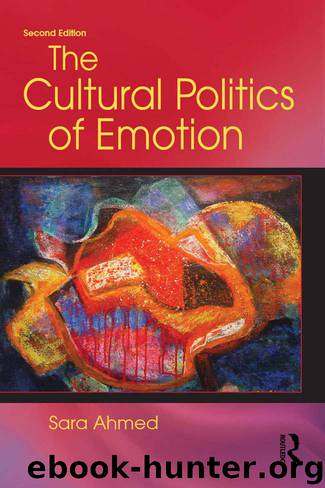Cultural Politics of Emotion by Sara Ahmed

Author:Sara Ahmed
Language: eng
Format: mobi, epub
Publisher: Edinburgh University Press
Published: 2014-06-10T22:00:00+00:00
THE NATIONAL IDEAL
In Group Psychology, Freud offers a theory of how love is crucial to the formation of group identities. Whilst maintaining that the aim of love is ‘sexual union’, Freud argues that other loves, whilst diverted from this aim, share the same libidinal energy that pushes the subject towards the loved object (Freud 1922: 38). For Freud, the bond within a group relies on the transference of love to the leader, whereby the transference becomes the ‘common quality’ of the group (Freud 1922: 66). Another way of saying this would be to say that groups are formed through their shared orientation towards an object. More specifically, groups are formed when ‘individuals. . . have substituted one and the same object for their ego ideal and have consequently identified themselves with one another in their ego’ (Freud 1922: 80, emphasis Freud’s). Now, it is here that Freud complicates the relation between identification and object choice, by showing how one form of love can become the other. In particular, he points to how the ego can assume the characteristics of the lost object of love though introjection (Freud 1922: 64).
In other words, the loss of the object is compensated for by ‘taking on’ the quality of the object. Mourning and grief become an expression of love; love announces itself most passionately when faced with the loss of the object (see Chapter 8 for an analysis of the role of grief in queer politics). Love has an intimate relation to grief not only through how the subject responds to the lost object, but also by what losses get admitted as losses in the first place. If I can imagine that the person who was lost ‘could-have-been me’, then the other’s grief can also become my grief. This ‘could-have-been-ness’ is a judgement on whether others approximate the ideals that I have already taken to be ‘mine’ or ‘ours’. So there is an intimate relation between lives that are imagined as ‘grievable’, in Judith Butler’s terms (Butler 2007), and those that are imagined as loveable and liveable in the first place.
Indeed, the impossibility that love can reach its object may also be what makes love powerful as a narrative. At one level, love comes into being as a form of reciprocity; the lover wants to be loved back, wants their love returned (Singer 1984: 6). At another, love survives the absence of reciprocity in the sense that the pain of not being loved in return – if the emotion ‘stays with’ the object to which it has been directed – confirms the negation that would follow from the loss of the object. Even though love is a demand for reciprocity, it is also an emotion that lives with the failure of that demand often through an intensification of its affect (so, if you do not love me back, I may love you more as the pain of that non-loving is a sign of what it means not to have this love).
We can see how
Download
This site does not store any files on its server. We only index and link to content provided by other sites. Please contact the content providers to delete copyright contents if any and email us, we'll remove relevant links or contents immediately.
Should I Stay or Should I Go? by Ramani Durvasula(7667)
Why We Sleep: Unlocking the Power of Sleep and Dreams by Matthew Walker(6725)
Fear by Osho(4738)
Flow by Mihaly Csikszentmihalyi(4697)
Rising Strong by Brene Brown(4459)
Why We Sleep by Matthew Walker(4445)
The Hacking of the American Mind by Robert H. Lustig(4382)
How to Change Your Mind by Michael Pollan(4356)
Too Much and Not the Mood by Durga Chew-Bose(4348)
Lost Connections by Johann Hari(4186)
He's Just Not That Into You by Greg Behrendt & Liz Tuccillo(3900)
Evolve Your Brain by Joe Dispenza(3678)
The Courage to Be Disliked by Ichiro Kishimi & Fumitake Koga(3503)
Crazy Is My Superpower by A.J. Mendez Brooks(3400)
In Cold Blood by Truman Capote(3384)
Resisting Happiness by Matthew Kelly(3341)
What If This Were Enough? by Heather Havrilesky(3311)
The Book of Human Emotions by Tiffany Watt Smith(3309)
Descartes' Error by Antonio Damasio(3278)
